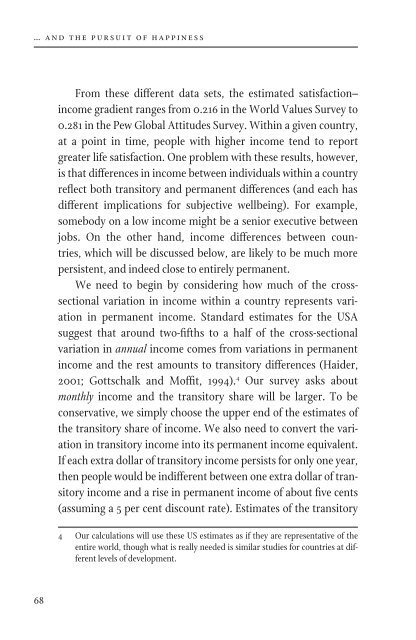… and the Pursuit of Happiness - Institute of Economic Affairs
… and the Pursuit of Happiness - Institute of Economic Affairs
… and the Pursuit of Happiness - Institute of Economic Affairs
You also want an ePaper? Increase the reach of your titles
YUMPU automatically turns print PDFs into web optimized ePapers that Google loves.
<strong>…</strong> <strong>and</strong> <strong>the</strong> pursuit <strong>of</strong> happiness<br />
subjective wellbeing<br />
From <strong>the</strong>se different data sets, <strong>the</strong> estimated satisfaction–<br />
income gradient ranges from 0.216 in <strong>the</strong> World Values Survey to<br />
0.281 in <strong>the</strong> Pew Global Attitudes Survey. Within a given country,<br />
at a point in time, people with higher income tend to report<br />
greater life satisfaction. One problem with <strong>the</strong>se results, however,<br />
is that differences in income between individuals within a country<br />
reflect both transitory <strong>and</strong> permanent differences (<strong>and</strong> each has<br />
different implications for subjective wellbeing). For example,<br />
somebody on a low income might be a senior executive between<br />
jobs. On <strong>the</strong> o<strong>the</strong>r h<strong>and</strong>, income differences between countries,<br />
which will be discussed below, are likely to be much more<br />
per sistent, <strong>and</strong> indeed close to entirely permanent.<br />
We need to begin by considering how much <strong>of</strong> <strong>the</strong> crosssectional<br />
variation in income within a country represents variation<br />
in permanent income. St<strong>and</strong>ard estimates for <strong>the</strong> USA<br />
suggest that around two-fifths to a half <strong>of</strong> <strong>the</strong> cross-sectional<br />
variation in annual income comes from variations in permanent<br />
income <strong>and</strong> <strong>the</strong> rest amounts to transitory differences (Haider,<br />
2001; Gottschalk <strong>and</strong> M<strong>of</strong>fit, 1994). 4 Our survey asks about<br />
monthly income <strong>and</strong> <strong>the</strong> transitory share will be larger. To be<br />
conservative, we simply choose <strong>the</strong> upper end <strong>of</strong> <strong>the</strong> estimates <strong>of</strong><br />
<strong>the</strong> transitory share <strong>of</strong> income. We also need to convert <strong>the</strong> variation<br />
in transitory income into its permanent income equivalent.<br />
If each extra dollar <strong>of</strong> transitory income persists for only one year,<br />
<strong>the</strong>n people would be indifferent between one extra dollar <strong>of</strong> transitory<br />
income <strong>and</strong> a rise in permanent income <strong>of</strong> about five cents<br />
(assuming a 5 per cent discount rate). Estimates <strong>of</strong> <strong>the</strong> transitory<br />
4 Our calculations will use <strong>the</strong>se US estimates as if <strong>the</strong>y are representative <strong>of</strong> <strong>the</strong><br />
entire world, though what is really needed is similar studies for countries at different<br />
levels <strong>of</strong> development.<br />
component <strong>of</strong> annual income suggest that it does not all dissipate<br />
in one year; indeed, <strong>the</strong> auto-regressive process estimated by<br />
Haider (2001) suggests that <strong>the</strong> permanent income equivalent <strong>of</strong><br />
a $1 rise in transitory income would be about twice <strong>the</strong> one-year<br />
value, or ten cents. Consequently a $1 increase in income in <strong>the</strong><br />
cross-section represents, on average, a 50 cent rise in permanent<br />
income, plus a 50 cent rise in transitory income, <strong>and</strong> this transitory<br />
income is valued as equivalent to a rise in permanent income<br />
<strong>of</strong> about five cents.<br />
This means that <strong>the</strong> rise in permanent income from a given<br />
change in recorded income is less than <strong>the</strong> change in recorded<br />
income. As such, <strong>the</strong> underlying relationship between wellbeing<br />
<strong>and</strong> permanent income is going to be even stronger than <strong>the</strong> relationship<br />
between wellbeing <strong>and</strong> recorded income. To interpret<br />
our estimated wellbeing–income gradient in terms <strong>of</strong> a $1 rise in<br />
permanent income, our cross-sectional estimates should be scaled<br />
up by about 80 per cent (1/0.55). We do this adjustment <strong>and</strong><br />
report <strong>the</strong> new coefficients in column 2. We find a higher gradient<br />
for <strong>the</strong> relationship between wellbeing <strong>and</strong> our estimates <strong>of</strong> <strong>the</strong><br />
log <strong>of</strong> permanent income <strong>of</strong> a little over 0.4. Overall, our reading<br />
<strong>of</strong> <strong>the</strong> within-country evidence is that <strong>the</strong> life satisfaction-log to<br />
permanent income gradient falls between 0.3 <strong>and</strong> 0.5.<br />
We should not push <strong>the</strong>se adjustments too hard, however.<br />
While it seems straightforward to think that permanent ra<strong>the</strong>r<br />
than transitory income determines subjective wellbeing, in fact<br />
direct evidence on this point suggests <strong>the</strong> opposite: subjective<br />
wellbeing <strong>and</strong> <strong>the</strong> business cycle move quite closely toge<strong>the</strong>r.<br />
Stevenson <strong>and</strong> Wolfers (2008) report that <strong>the</strong> output gap strongly<br />
predicts subjective wellbeing, at least in <strong>the</strong> USA. Wolfers (2003)<br />
shows this also holds in Europe <strong>and</strong> across states in <strong>the</strong> USA.<br />
68 69












